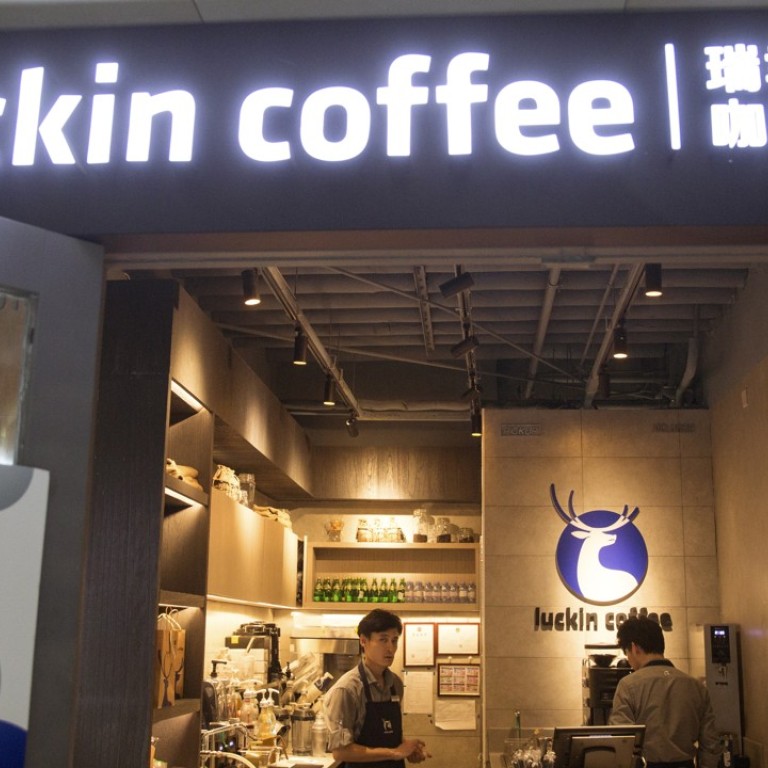
China’s Luckin Coffee confirms US$200 million raised in latest funding round as it aims for even faster delivery time
Less than 20 minutes – or 18.2 minutes to be precise – is how long Luckin Coffee says an average consumer in major Chinese cities has to wait after placing an order through their phone.
Still, the delivery time is not fast enough, at least for Jenny Qian Zhiya, chief executive of the cafe start-up, who is counting on a growing taste for coffee among the mostly tea-drinkers in the world’s most populous nation.
Having announced a US$200 million funding round this week, the cafe chain operator – which claims a unicorn-status valuation of US$1 billion – is building up its war chest to take on the country’s leading player Starbucks.
Luckin’s investors include Singapore’s sovereign fund GIC, Centurium Capital, a private equity fund founded by the former China head of Warburg Pincus, Legend Capital and Joy Capital.
“Although the delivery time is already within half an hour, we will cut it even shorter,” Qian said on Thursday. “The best experience should be that the coffee is still icy in summer when it reaches customers, while still hot enough to warm hands in winter.”
On the way to achieving that goal, the Xiamen-based start-up has already spent 1 billion yuan (US$150 million) in the six months since its soft launch, Qian said. About 600 physical stores have mushroomed in 13 Chinese cities since the start of the year, and five million cups were sold in the first four months.
Among them, just under half are effectively “takeaway kitchens”, where coffee is prepared exclusively to fill delivery orders from customers, fitting into the "new retail" strategies becoming increasingly popular among e-commerce and traditional retailers in China that combine online and offline operations, according to the company.
“Previously, you had to look for coffee, but now coffee comes to you,” she said in a small group media interview in Beijing, adding that Luckin wants to cater to customers “at any moment”, whether they are at work, on a university campus or even at a service station while filling up their car.
The standard price for a large latte is 24 yuan, according to Luckin’s app, about 20 per cent cheaper than a comparable order at Starbucks. The Chinese company’s special offers include “buy two, get one free” and “buy five, get five free”. A free drink is offered for any order that does not arrive within half an hour, or is spilt.
“With the latest funding round and other financing, we now have a cash reserve of 2 billion yuan,” Qian said. “The company is in no rush to make a profit.”
If the sentiment sounds familiar, it is because Luckin’s strategy is not unique in China, where new on-demand services typically offer heavy subsidies at first in order to gain a critical mass of users. Luckin is among the raft of start-ups that are capitalising on the rise of on-demand services in China. The country is home to 772 million internet users and has 11 times more mobile payment users than the US, according to the China Internet Report published this week by the South China Morning Post, Abacus and 500 Startups.
Before starting Luckin, Qian was chief operating officer of China’s car rental giant CAR Inc and its ride-hailing affiliate UCAR.
The CEO is adamant that a successful internet strategy is not simply offering subsidised on-demand services, rather it is one that is “customer-centric”.
Qian said the company will continue to rely on technologies such as optimisation of delivery routes and IT systems and use of internet-connected coffee machines for real-time monitoring to improve efficiency and reduce costs.
Seen as an up-and-coming challenger to Starbucks in China, Luckin has filed a law suit against its Seattle-based rival for alleged monopolistic practices, including signing exclusive rental contracts that block property owners from leasing to another coffee brand.
Qian confirmed that a Chinese court has accepted the case and it is under proceedings.
Starbucks is currently the country’s dominant coffee provider, with a market share of about 58.6 per cent, according to data from Euromonitor International. It plans to build about 3,000 new stores in mainland China by 2022, which would roughly double its current number of 3,300, according to a company announcement in May.
“Luckin will be a strong rival to Starbucks,” said Qian. “It fits our idea to make coffee affordable.”
Luckin will soon face more competition from an overseas brand with Tim Hortons, a Canadian coffee maker, planning to open 1,500 shops in China over the next 10 years.
“It’s a vast market that is far from being well catered for,” said Qian. “People think of drinking coffee as a luxury as most ‘professional’ brands price it at over 30 yuan a cup, and there are not many cafes either. The long queues and high cost has restricted consumption desire as well as frequency.”

